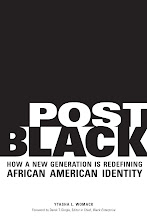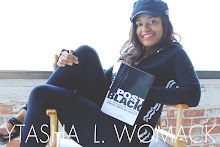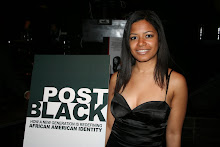Wednesday, September 15, 2010
Color in Comics: Interview with Comic Book Creator John Jennings
John Jennings is the coauthor and illustrator of the new book Black Comix: African American Independent Comics, Art and Culture.
YLW: How did you become interested in comics?
JJ: My mom introduced them to me. She’s a former English literature major. I actually started reading Norse and Greek mythology first. One day she brought home a Thor comic and from then on I wanted to read more. Then I segued into Spider-Man, Hulk, Marvel Comics. I wanted to read anything - Richie Rich, Casper the Friendly Ghost. There was something about the images that attracted me.
YLW: When did you start drawing?
JJ: I started drawing or trying to draw stuff at four or five. I’ve been drawing since I was really young. At ten or 11, I was trying to make comic books.
YLW: Where did you grow up?
JJ: I grew up in Flora, MS. It’s 15 min north of Jackson, a small farming community. We grew soy beans and cotton out there.
YLW: How did growing up in the rural South contribute to your approach to comics?
JJ: It made me practice a lot more. We didn’t have access to much. We didn’t have cable. I used my imagination more. I was so segregated from people. I lived way out in the country. It was so far the school bus wouldn’t come out there. My grandmother had to take me to the bus.
YLW: Growing up, did you realize how few black images existed in comics?
JJ: When I first started drawing comics, it didn’t faze me that there weren’t a lot of black comics. There were only a few: Luke Cage, Black Panther. I really liked those images, but it didn’t occur to me that there weren’t a lot of images until much later. As a professor, I studied media and images. There are so many negative images. Kids have to see themselves as creators of cultural capital, and create with meaning.
YLW: Why do feel that the lack of images of color in comics didn’t have the same impact on you as it did for others?
JJ: That’s an interesting question. I think as a kid you’re kind of oblivious to stuff until you have to deal with it. You stumble across problems and you solve them as you get to them. I didn’t think about it until college or grad school. People become aware of things at different times. If my mom had taken time to explain it to me, maybe I would have thought about it more . The guy who created Brotherman [Dawud Anyabwile] ,his father told him that there weren’t a lot of images and he rebelled and didn’t want to read comics anymore. People deal with information when they get to it.
YLW: Why did you create Black Comix?
JJ: It stems from some of the research that me and Damian (Damian Duffy, co author) have been doing for the last five years on independent black comics. We wanted to look at these types of books done by African American creators and the diversity of things that were offered. Also, if you’re not white and you’re in this country you’re starving for images of yourself. So with this book, kids get to see people who look like them who are creating this work. We also wanted to look at the culture.
YLW: What culture? Comic culture? African American culture?
JJ: The Black Age of Comics. It’s a movement that’s been going on since the late 90s. I don’t know if you collect comics, but there are various “ages” just like in art. Comics have a golden age, for example. However, Turtel Onli who teaches at Kenwood Academy said, 'well what about our age?'. So there’s a Black Age of Comics Convention at Kenwood Academy in Chicago. The next one is in October. There’s the East Coast Black Age of Comics in Philidelphia. There’s the Motor City version. There’s the Onyx Comics which I just came from in Atlanta. There’s this subculture that supports the work.
YLW: How have people responded to Black Comix?
JJ: So far pretty favorably. We were interviewed by GQ magazine. The library scene has been picking it up.
YLW: What are some of the indie classics?
JJ: Brotherman. In fact it’s ready to launch a graphic novel based on it. It was done in the 90s. Totally self produced. Tribe by Larry Stroman [and Todd Johnson], it was an alternative English comic. Tribe is the best selling black book of all time. We have some previously unpublished pages of Tribe in our book.
YLW: What are some of the new comic creators to look out for?
JJ: Millenium Wars by Ashley Woods, she’s out of Chicago. She released her first trade paperback and she produced it. Trimekka Studios out of North Carolina is another. They are a group who work on comics. They did Abraham: The Young Lion, Blackbird, Deadly Artisans. I think they’re about to do a crime comic, too. Jaycen Wise created by Richard Tyler. Wise is a cool character. He’s immortal and has lived for thousands of years so he can be in any kind of adventure. They’ve done him in Ancient Rome. I think they’re doing a western. There are a lot of ideas out there that I think people would be excited about if they knew about them.
YLW: Do you see any similarities in theme or illustration style in black comics?
JJ: One thing we see is that black kids, like most kids are influenced by manga from Japan but they also like to infuse it with graffiti and hip hop. There’s Shana Mills. Her work looks like graffiti meets Japanese manga. I also see these afrocentric vibes where people use the comics as a political standpoint. Instead of basing characters after these Greco Roman images, they pull from other non western imagery. For example, Jiba Molei Anderson has these characters called the Horsemen, but he uses the Orishas as the mythology to fuel the narrative. He lives in Chicago, too.
You can see an aesthetic, however as far as story arcs, they are as varied as we are. You’ll have stuff in there that’s funny, political satire, fantasy. You have fantasy that doesn’t represent blackness. Like Millenium Wars, you probably wouldn’t know that a black woman created the work. Whereas with Brotherman, it’s a political satire. It just depends on what the intention of the artist is. You can’t pin it down. But there are so many modes of what blackness can be. I showed this book to my director and he said, 'wow, they’re so varied'. But they would be. It’s a Post Black kind of thing. What is a post black comic book? Whatever it is you need it to be.
YLW: What do you hope people will take away from Black Comix?
JJ: As a comic creator, I want people to know that you can do anything with comics. American comics are dominated by superheroes in the mainstream. But in the independent, they can tell any story they want. People get comics mixed up. They think it’s a genre, but it’s a medium. I also want people to know they can create a comic whenever they want to. It’s possible for people to do that. I want people to leave with inspiration and empowerment. Especially younger people who feel, 'gee, I didn’t know I could do this'.
For more information go to http://www.blackcomixbook.com/
Subscribe to:
Comments (Atom)





